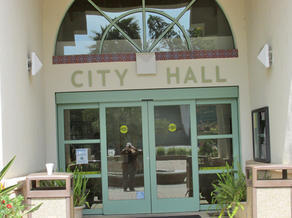Ambivalent council member casts deciding vote to adopt new ordinance
The City Council on Tuesday voted 3-2 to adopt an ordinance that changes the way Avalon approves short-term rental properties. Existing conditional use permits allowing transient rentals will be replaced with city-issued business licenses.
Property owners who have conditional use permits will keep their CUPs until the second sale of the property.
The transient license would have to be renewed annually.
Mayor Anni Marshall and Council Member Michael Ponce cast the dissenting votes. Ponce objected to taking something of value from people who already had CUPs to rent out some of their properties.
Council Member Cinde MacGugan Cassidy, however, said she did not believe there was an increase in property value in having a CUP. She was also uncomfortable with taking something from people that they already had. Cassidy expressed ambivalence toward the issue.
Marshall preferred what she called the simpler alternative of requiring transient rental to be rented out for a minimum number of days. (Staff recommended 15 days or another number to be determined.) Currently the city code requires transient rental properties to be rented out for a minimum of one day a year or the city can begin the permit revocation process, according to Finance Director Matt Baker.
Another alternative, supported by Ponce, would have grandfathered the existing CUPs and gone forward with licensing transient rentals in the future. (Following the final vote, Council Member Lisa Lavelle asked Marshall if she wanted to bring the issue of minimum number of days’ rental back to a future meeting. Marshall said yes.)
Lavelle, a past Planning Commission member who had worked on the same issue, said that the commission’s goal was to “level” the playing field” to make the transient rental license something that goes with the owner and not the home. She described the goal as making sure that the cost of the home wasn’t giving people an incentive to sell a home for the purpose of making a property a vacation rental.
Marshall said if the city wants to help people with housing, the city has to find another way to do it.
It actually took two separate votes—one to determine whether there was a consensus among the council members and another to formally adopt the change to the city code.
Because this meeting was held on Zoom rather than in the council Chambers, the vote was cast by roll.
During the vote on whether there was a consensus, Council Member Cinde MacGugan Cassidy hesitated for many seconds before casting her “yes” vote.
Marshall said: “Oh, God.” Then she voted no.
The was the same when it came time to actually vote on whether to adopt the new city law.
Following that second vote, Cassidy said the “pit” she felt in her stomach caused her to think about changing her vote, but felt that the Planning Commission did their job. She said she wanted to respect the recommendations of the commission.
Marshall said she respected Cassidy’s respect, but pointed out that in recent week there had been significant public pushback against the proposed changes.
Council Member Yesenia De La Rosa said: “We’re not giving people from the Island the chance to be homeowners and that to me is the problem.”
Ponce asked how many people can afford to buy some of the houses that have CUPs.
De La Rosa asked if the finance director could tell the council how much money on average people earn on their CUPs for short term rentals.
Finance Director Baker estimated that the city received the average CUP pays $4,000 to $5,000 a year in transient occupancy tax. He said some short term rental owners pay $100 a year and others pay tens of thousands, but that was the average.
According to Assistant City Manager Michael Parmer, the city received 14 letters from the public that were against the proposed ordinance and two in favor.











